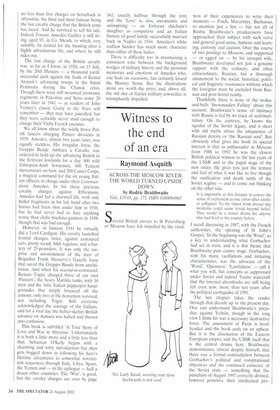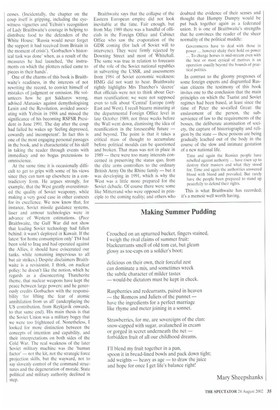Witness to the end of an era
Raymond Asquith
ACROSS THE MOSCOW RIVER: THE WORLD TURNED UPSIDE DOWN by Rodric Braithwaite Yale, £19.65, pp. 371, ISBN 0300094965 Several British envoys to St Petersburg or Moscow have felt impelled by the vivid
ness of their experiences to write their memoirs — Finch, Macartney. Buchanan, to mention just a few — but not all of Rodric Braithwaite's predecessors have approached their subject with such verve and general good sense, humour and learning, curiosity and caution. Over the course of two postings to Moscow, and supported — or egged on — by his intrepid wife, Braithwaite developed not just a genuine rapport with the ordinary, and often extraordinary, Russian, but a thorough attunement to the social, historical, political and linguistic resonances without which the foreigner must be excluded from Russian and post-Soviet reality.
Thankfully there is none of the troikaand-bells `Snowmaiden Fallacy' about this account: Braithwaite's sense of intimacy with Russia is fed by no trace of sentimentalism. On the contrary, he knows the squalor of the Soviet legacy, and is short with old myths about the uniqueness of Russian destiny or 'the Russian soul'. But obviously what gives the book its special interest is that as ambassador in Moscow from 1988 to 1992 he was the closest British political witness to the last years of the USSR and to the pupal stage of the new order. He gives you just the texture and feel of what it was like to live though the ossification and death rattle of the Soviet regime — and to come out blinking on the other side.
It is impossible at this distance to convey the sense of excitement as one taboo after another collapsed. To the visitor from abroad tiny incidents could seem trivial beyond belief. They would be a minor drama for anyone who had lived in the country before.
I recall discussing in 1987, with the French authorities, the opening of St John's Gospel, 'In the beginning was the Word', as a key to understanding what Gorbachov had set in train, and it is this theme that Braithwaite puts centre stage. Gorbachov, with his many vacillations and irritating characteristics, was the advocate of the 'Word', 'Openness', 'Lawfulness' — call it what you will, but concepts so suppressed under Soviet and indeed Tsarist statecraft that the internal aftershocks are still being felt even now, more than ten years after the political earthquake of 1991.
The last chapter takes the reader through that decade up to the present day. One can understand Braithwaite's prejudice against Yeltsin, though in the long view I think his was a necessary destructive force. The assessment of Putin is levelheaded and the book ends on an upbeat. But it is the dissolution of the Eastern European empire and the USSR itself that is the central drama here. Braithwaite demonstrates, almost despite himself, that there was a formal contradiction between Gorbachov's political and constitutional objectives and the continued existence of the Soviet state — something that the putschists of August 1991 correctly divined, however primitive their intellectual pro
cesses. (Incidentally, the chapter on the coup itself is gripping, including the eyewitness vignettes and Yeltsin's recognition of Lady Braithwaite's courage in helping to distribute food to the defenders of the White House: 'Russia would never forget the support it had received from Britain in the moment of crisis.). `Gorbachov's historical task was done' when, as a result of the measures he had launched, 'the instruments on which the plotters relied came to pieces in their hands'.
One of the charms of this book is Braithwaite's readiness, in the interests of not rewriting the record, to convict himself of mistakes of judgment or omission. He volunteers how he got Sakharov wrong, advised Afanasiev against demythologising Lenin and the Revolution, avoided associating with Yeltsin in 1988 and missed the significance of his becoming RSFSR President in June 1991. The day after the coup had failed he wakes up 'feeling depressed, cowardly and incompetent'. In fact this is one of the most engaging personal passages in the book, and is characteristic of his skill in taking the reader through events with immediacy and no bogus pretensions to omniscience.
At the same time it is occasionally difficult to get to grips with some of his views since they can turn up elsewhere in a contradictory form. He argues strongly, for example, that the West greatly overestimated the quality of Soviet weaponry, while making a very good case in other contexts for its excellence. We now know that, for instance, Soviet missile guidance systems, laser and armour technologies were in advance of Western estimations. (Pace Braithwaite, the Gulf War did not show that leading Soviet technology had fallen behind: it wasn't deployed in Kuwait. If the latest 'for home consumption only' T84 had been sold to Iraq and had operated against the Allies, it should have eviscerated our tanks, while remaining impervious to all but air strikes.) Despite disclaimers Braithwaite is a revisionist, I think, on nuclear policy: he doesn't like the notion, which he regards as a disconcerting Thatcherite theme. that nuclear weapons have kept the peace between large powers: and he generously credits Gorbachov with the responsibility 'for lifting the fear of atomic annihilation from us all' (underplaying the US contribution, from Reykjavik onwards, to that same end). His main thesis is that the Soviet Union was a military bogey that we were too frightened of. Nonetheless, I looked for more distinction between the concepts of intention and capability, and their interpretations on both sides of the Cold War. The real weakness of the later Soviet military machine was the 'human factor' — not the kit, not the strategic force projection skills, but the wayward, not to say slovenly control of the command structures and the degeneration of morale. State political and military authority declined in step. Braithwaite says that the collapse of the Eastern European empire did not look inevitable at the time. Fair enough, but from May 1989 there was a handful of officials in the Foreign Office and Cabinet Office who saw the evaporation of the GDR coming (for lack of Soviet will to intervene). They were firmly rejected by Downing Street and most of Whitehall. The same was true in relation to forecasts of the role of the Soviet national republics in subverting the USSR, and assessments from 1984 of Soviet economic weakness: HMG did not want to hear. Braithwaite rightly highlights Mrs Thatcher's 'decree' that officials were not to think about German reunification: we were not supposed even to talk about 'Central' Europe (only East and West). I recall bizarre minuting at the departmental Foreign Office level in late October 1989, not three weeks before the Wall went down, dismissing the idea of reunification in the foreseeable future — and beyond. The point is that it takes a critical mass of thought to accumulate before political moulds can be questioned and broken. That mass was not in place in 1989 — there were too many interests concerned in preserving the status quo, from the elite arms controllers to the ordinary British Army On the Rhine family — but it was developing in 1991, which is why the West was a little more prepared for the Soviet debacle. Of course there were some like Mitterrand who were opposed in principle to the coming reality; and others who doubted the evidence of their senses and thought that Humpty Dumpty would be put back together again as a federated union. It is one of Braithwaite's strengths that he convinces the reader of the sheer normality of the political muddle:
Governments have to deal with those in power ... however shaky their hold on power ... To change horses in mid-stream even with the best or most cynical of motives is an operation usually beyond the bounds of practical politics.
In contrast to the gloomy prognoses of some foreign experts and disgruntled Russian citizens the testimony of this book invites one to the conclusion that the main principles on which the Tsarist and Soviet regimes had been based, at least since the time of Peter the so-called Great: the enslavement of the person, the subservience of law to the requirements of the bosses, the deliberate atomisation of society, the capture of historiography and religion by the state — these poisons are being gradually leached out of the body in the course of the slow and intimate gestation of a new national life.
Time and again the Russian people have rebelled against authority ... have risen up to destroy their masters and what they stood for. Time and again the authorities answered blood with blood and prevailed. But rarely have the people been prepared to stand up peacefully to defend their rights.
This is what Braithwaite has recorded; it's a memoir well worth having.































































 Previous page
Previous page